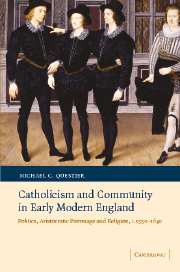 Catholicism and Community in Early Modern England
Catholicism and Community in Early Modern England Published online by Cambridge University Press: 06 July 2010
The story of how the political difficulties of the crown were exponentially increased in the later 1630s and the early 1640s by Catholicism and Catholic activism has been told a number of times, and notably by Caroline Hibbard. Professor Hibbard has shown how the papal agent George Con, almost from the first moment that the Scots rebelled, manipulated the breakdown of proposals for an Anglo-French alliance. He contrasted loyal Catholic subjects with rebellious (Scottish) Protestants, and suggested that papal authority might be called upon to prevent foreign intervention in Scotland. Con's activities were a prime source for the formulation of contemporary ‘popish-plot’ conspiracy theories, as was the involvement of Catholics (predominantly Irish and Scottish, but also some English and Welsh) in the attempt to put down the Covenanters. When Scottish Catholic peers were heavily involved in grossly unsuccessful but high-profile attempts in Scotland to take on the Covenanters, and when English crypto-Catholic peers such as the earl of Arundel were prominent among those leading the king's forces up country to confront the Scottish rebels, neither the rank and file nor even the officer corps had to be predominantly professing papists to excite the kind of widespread popular hostility which manifested itself in the riots and disturbances charted so well by Robin Clifton.
There has, however, been a debate about the extent of Catholic involvement in the war. It was axiomatic among pro-parliament propagandists that royalist forces were riddled with Catholics, even dominated by them.
To save this book to your Kindle, first ensure [email protected] is added to your Approved Personal Document E-mail List under your Personal Document Settings on the Manage Your Content and Devices page of your Amazon account. Then enter the ‘name’ part of your Kindle email address below. Find out more about saving to your Kindle.
Note you can select to save to either the @free.kindle.com or @kindle.com variations. ‘@free.kindle.com’ emails are free but can only be saved to your device when it is connected to wi-fi. ‘@kindle.com’ emails can be delivered even when you are not connected to wi-fi, but note that service fees apply.
Find out more about the Kindle Personal Document Service.
To save content items to your account, please confirm that you agree to abide by our usage policies. If this is the first time you use this feature, you will be asked to authorise Cambridge Core to connect with your account. Find out more about saving content to Dropbox.
To save content items to your account, please confirm that you agree to abide by our usage policies. If this is the first time you use this feature, you will be asked to authorise Cambridge Core to connect with your account. Find out more about saving content to Google Drive.